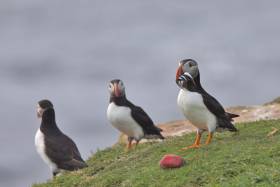Displaying items by tag: Puffins
Puffins May Benefit From Closure of Industrial Sand Eel Fishery in North Sea and Scottish Waters
The Royal Society for the Protection of Birds (RSPB) anticipates that puffins will benefit from the closure last month of the industrial fishery for sand eels in the North Sea and Scottish waters.
The closure of the fishery from March 26th is coming into place in time for the breeding season for puffins, the RSPB says.
“Sandeels, a main source of food for puffins and their chicks, are a vital link in the food chain for seabirds, as well as some fish species and sea mammals, yet their numbers have been rapidly declining due to climate change and overfishing,” it says.
“The charismatic birds have already been delighting visitors in recent weeks as they arrive back at Rathlin Island, Northern Ireland, RSPB South Stack, North Wales, RSPB Sumburgh Head in Shetland, and at RSPB Bempton Cliffs, Britain’s largest mainland seabird colony,” it says.
Dave O’Hara, senior site manager at RSPB Bempton Cliffs, said it is “home to one of the UK's top wildlife spectacles”.
“But these populations of seabirds are at the forefront of the climate emergency, and they are in significant decline. Puffins’ resilience is being pushed to the limit, which is why we can breathe a sigh of relief that industrial sandeel fishing in UK waters has now been ended,”he said.”
The most recent *seabird census, Seabirds Count, published in November 2023, suggests that around one in four puffins have been lost across Britain since 2000.
“It's predicted that the UK's puffin population could plunge 90% by 2050 if global warming is unchecked. Facing threats to both their nesting sites and their food supply, the climate crisis is sadly only making things worse for these clowns of the sea,”it says.
Puffins will continue arriving throughout April, staying to raise their pufflings (one egg is laid per puffin), and then leaving at the end of July.
The tiny birds winter out at sea, and are widely dispersed out in the North Sea and wider Atlantic Ocean.
New research on Irish puffins has revealed that the sea birds swap the skies for the sea and make use of strong total currents to save energy when they search for food.
The two-year study by MaREI and conservation charity ZSL tracked puffins from Little Saltee, Co Wexford by GPS — and discovered that the birds are using the strong tidal currents in the region for a ‘free ride’ across feeding areas, saving them close to half of their usual energy usage.
Previous seabird tracking studies have shown that birds travel between often distant patches at sea where they concentrate feeding, requiring considerable effort — particularly for puffins, whose wings are short and adapted for swimming underwater.
“Our puffins have completely dispensed with the need to fly between patches of food,” said lead author Ashley Bennison, a researcher at MaREI.
It is as yet unclear exactly how the Saltee Islands’ puffins came to adapt their behaviour.
But the study, which marks the first time Irish puffins have been tracked in this manner, concludes that such behaviours are likely to be found elsewhere.
“We have long suspected that animals are able to adapt their foraging behaviour to the local environment, and this is an excellent example of how animals can surprise us with their ingenuity,” Bennison said.
The full study is published in the journal Biology Letters.




























































